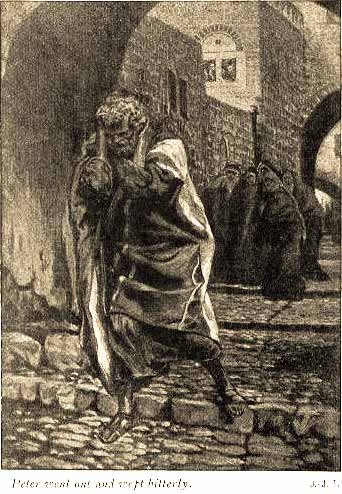A reader recently sent in the following questions about the death of Jesus as the Son of God and how it affected God the Father. Specifically, they wanted to know if God knew what it was like to lose a son. Here is the question:
I am a believer, but I am troubled by an atheist’s questions. I was talking to an atheist the other day, and he said that God doesn’t know what it’s like to lose a son because he knew all along that Jesus would rise in three days, so he only lost him for the weekend! He also questioned that if God is Jesus, why did he beg to be saved from the cross when he was in the garden? Also, shouldn’t Jesus already have known he would rise again in three days? Why did he ask God, “Why have you forsaken me?” Wouldn’t he know that he’s only going to be dead three days?
I began to answer these questions in a post about the existence of God by looking at the basic approach I use when answering questions from atheists (or anyone with whom I disagree about anything). Actually answering the questions (or attempting to do so) will require several posts. Here is the order I will answer these questions:
- How to Answer Questions of Atheists
- 2 Traditional Explanations for How God knows what it is Like to Lose a Son (both of which I reject)
- 2 Ways God Knows What it is like to lose a Son
- Why did Jesus say, “My God, My God, Why have You forsaken Me?”
So in this post, I will look at two traditional explanations for how God knows what it is like to lose a son, and I will also explain why I reject both explanations (which might also be why atheists and other people reject these explanations as well).
Does God Know What it is Like to Lose a Son? (Traditional Answers)
 Sometimes this question is asked this way: “How could God know what it is like to lose a son if He knew Jesus was just going to rise from the dead three days later?” Or “How could the death of Jesus be a sacrifice for God if God knew that Jesus was just going to rise again from the dead?”
Sometimes this question is asked this way: “How could God know what it is like to lose a son if He knew Jesus was just going to rise from the dead three days later?” Or “How could the death of Jesus be a sacrifice for God if God knew that Jesus was just going to rise again from the dead?”
These are all very good questions, which are not so easily answered! Nevertheless, there are two popular answers I have heard which attempt to explain how God knows what it is like to lose a son.
1. Christians Know Their Children Will Rise Too
It is sometimes suggested that God knew Jesus would rise from the dead just as all Christian parents know that their dead children will rise from the dead.
This, I believe, is a weak answer.
God knew with absolute certainty that the death of Jesus would end in the resurrection of Jesus; but not all parents have this same certainty. Not even all Christian parents have this certainty.
Furthermore, even when parents know they will be reunited with lost loved ones in the future, Jesus was only in the grave for three days, while parents who lose a son or daughter have to wait the rest of their life.
While nobody wants to lose a son or daughter (or any family member for that matter), the pain of it would be significantly lessened, it seems, if we knew that we would receive our lost loved ones back within three days, and they would be fully healthy and whole and would never suffer or die again.
So when viewed from this perspective, the claim that God knows what it is like to lose a son seems rather hollow, does it not?
2. God lives in an Eternal Now
The second way some people try to explain how God knows what it is like to lose a son is through the view that God exists outside of time, that God is timeless. If this is true, rather than experiencing a sequence of events (as we do), God experiences all events as an eternal now. It is argued then, that the crushing, heart-wrenching pain of watching a child die, and the sense of deep loss that lingers afterwards for days, months, and even years in the hearts of parents, is the pain that God experiences for an eternity over the death of His Son.
 Though I was taught in Bible college and Seminary that God is timeless, that He exists outside of time in a constant, eternal now, I don’t believe it. There are numerous reasons why, which I won’t get into here. I believe that God is relational and is capable of reacting to our needs and prayers in a way that would not be possible if He were outside of time.
Though I was taught in Bible college and Seminary that God is timeless, that He exists outside of time in a constant, eternal now, I don’t believe it. There are numerous reasons why, which I won’t get into here. I believe that God is relational and is capable of reacting to our needs and prayers in a way that would not be possible if He were outside of time.
But even if this view is true, it still doesn’t allow God to experience what it is like to lose a son. For even if He eternally experiences the crushing sorrow of losing a child, He also eternally experiences the joy of being with His Son for eternity, and the even more thrilling experience of His Son rising from the dead. Neither of these eternal experiences can be shared by humans, and so even in this view, God does not know what it is like to lose a son in the same way that humans do.
So where do we go from here?
In a future post, I will look at the two reasons I think God does know what it is like to lose a son, and in so doing, will see that God may actually know better than we what it is like. Interested to hear more? Check back tomorrow. (Edit: The links are listed above).
What do you think of the two explanations above? Are you aware of any other explanations that Christians sometimes give for whether or not God knows what it is like to lose a son? Weigh in by sharing below!
The cross of Jesus is CENTRAL to everything!
Transform your life and theology by focusing on the crucifixion and resurrection of Jesus:
Fill out the form below to receive several emails from me about the death and resurrection of Jesus.
(Note: If you are a member of RedeemingGod.com, login and then revisit this page to update your membership.)




 The final piece of the puzzle about how to understand the violence of God in the Old Testament in light of life, ministry, and death of Jesus Christ is found in 2 Corinthians 5:21.
The final piece of the puzzle about how to understand the violence of God in the Old Testament in light of life, ministry, and death of Jesus Christ is found in 2 Corinthians 5:21. I could tell by the way Jesus twitched and squirmed that the ants were not just climbing over His body, but were biting Him as well. I was surprised that Jesus did not cry out in pain, but I knew that if He did, they would enter His mouth and eat Him alive from the inside out. As soon as I had this horrifying thought, Jesus looked me in the eyes and then opened His mouth wide. As expected, the mass of ants swarmed in and they ate Jesus alive. Soon, there was nothing left of Jesus, only a black mass of ants.
I could tell by the way Jesus twitched and squirmed that the ants were not just climbing over His body, but were biting Him as well. I was surprised that Jesus did not cry out in pain, but I knew that if He did, they would enter His mouth and eat Him alive from the inside out. As soon as I had this horrifying thought, Jesus looked me in the eyes and then opened His mouth wide. As expected, the mass of ants swarmed in and they ate Jesus alive. Soon, there was nothing left of Jesus, only a black mass of ants. How can a God who says "Love your enemies" (Matthew 5:44) be the same God who instructs His people in the Old Testament to kill their enemies?
How can a God who says "Love your enemies" (Matthew 5:44) be the same God who instructs His people in the Old Testament to kill their enemies?

 In other words, C. S. Lewis says that even if God Himself spoke to Lewis and told him that it was all a lie, that God had tried His hardest, but had finally lost, and was now about to disappear into oblivion and defeat, C. S. Lewis says it would not matter one bit. He would still stick with God. He would not switch sides. He would go down fighting, next to our dying God.
In other words, C. S. Lewis says that even if God Himself spoke to Lewis and told him that it was all a lie, that God had tried His hardest, but had finally lost, and was now about to disappear into oblivion and defeat, C. S. Lewis says it would not matter one bit. He would still stick with God. He would not switch sides. He would go down fighting, next to our dying God.
 What does Jesus think about doubt?
What does Jesus think about doubt?

 What are the most beautiful words in the Gospels?
What are the most beautiful words in the Gospels? Yet despite all this zeal for Jesus, it was only Peter who verbally denied Jesus. It was only Peter who cursed Jesus. Not once. Not twice. But three times. (
Yet despite all this zeal for Jesus, it was only Peter who verbally denied Jesus. It was only Peter who cursed Jesus. Not once. Not twice. But three times. (